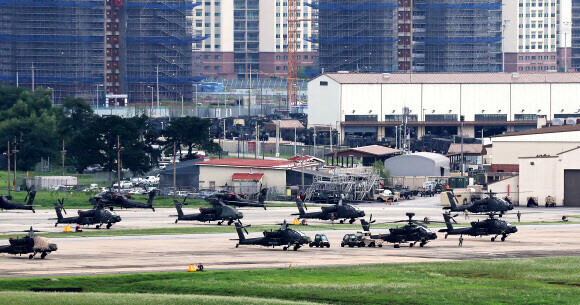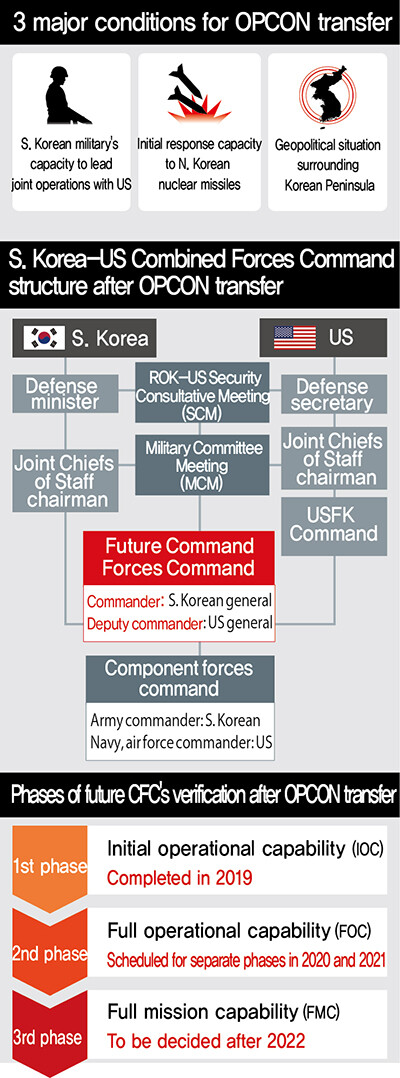hankyoreh
Links to other country sites 다른 나라 사이트 링크
[News analysis] Why the US went from being responsive to uncooperative regarding the OPCON transfer

While running for president, South Korean President Moon Jae-in pledged to reclaim wartime operational control (OPCON) of South Korean forces from the US during his five-year term in office. But after his inauguration, his administration adjusted the official timeline for the OPCON transfer from “during Moon’s term” to “quickly.” That adjustment was motivated by an agreement reached during Moon’s summit with US President Donald Trump in June 2017 for the two countries to “continue cooperation at the alliance level to make it possible to quickly transfer OPCON to the South Korean military.” Seoul yielded to opposition during negotiations with the US over its desire to carry out the OPCON transfer before Moon leaves office.

Nevertheless, the Blue House has reportedly been aggressively pushing to complete the OPCON transfer within Moon’s term, bearing in mind former President Roh Moo-hyun’s ultimate failure to complete the transfer. While Roh reached an agreement with the US about the OPCON transfer, the specified timing was April 2012, after he left office. As a result, that agreement was further delayed under the next two presidents, Lee Myung-bak and Park Geun-hye.
“Both then and now, failing to complete the transfer before Moon leaves office opens the possibility of all our efforts going to waste when power changes hands,” a government official said.
The agreement between South Korea and the US states that the OPCON transfer is dependent on three factors: South Korean military’s joint operational capability, the capability to quickly respond to North Korean nuclear weapon and missile threats, and the situation around the Korean Peninsula. That means that the OPCON transfer doesn’t happen automatically even after the three phases of verification (initial operational capability, full operational capability, and full mission capability) of the future Combined Forces Command (CFC), which is to be commanded by a South Korean general following the transfer. Separately from the three phases of assessment of the future CFC’s capability, South Korea and the US would have to discuss whether the three conditions have been met.
COVID-19 combined with US resistance to delay transferBut if the three phases of assessment are completed and the military capability to respond to North Korea’s nuclear weapons and missile threats is developed as planned, the three conditions for the OPCON transfer are expected to be satisfied as well. But since the three phases of assessment have been delayed because of the unexpected factor of this year’s COVID-19 pandemic, the schedule for the OPCON transfer is likely to stretch beyond the end of Moon’s presidency in May 2022.
The uncooperative behavior of the US Army is another factor in the growing difficulty of completing the OPCON transfer before Moon leaves office. The US has reportedly insisted that its upcoming joint exercise with South Korea should be focused on joint readiness for the North Korean threat, contradicting South Korea’s position that the exercise should be focused on assessing the full operational capability of the future CFC in order to move forward with the OPCON transfer. South Korean Defense Minister Jeong Kyeong-doo even met personally with US Forces Korea (USFK) Commander Robert Abrams on July 7 in an attempt to iron out the two countries’ disagreements.
Bush administration responded positively to OPCON transferNegotiations about the OPCON transfer went smoothly under the Roh administration because of the alignment of South Korean and US interests at the time. Based on his confidence about South Korea’s huge economic advantage over the North and warmer relations with the North, Roh strongly felt that the time had come for the South to recover OPCON from the US military. It just so happened that the Bush administration in the US was seeking to make US forces stationed overseas more flexible, mobile, and limber in order to respond to terrorist threats following the 9/11 attacks, and the Americans responded positively to the idea of the OPCON transfer in order to reduce USFK’s burden for defending the Korean Peninsula.
But the US attitude changed after inter-Korean relations cratered following the sinking of the Cheonan corvette in March 2010 and the shelling of Yeonpyeong Island that November. Then Defense Minister Kim Kwan-jin, who was appointed to the post that December, started pushing for a harsh response that included “acting in self-defense” and “hitting back at the points of origin,” which reportedly caused Americans to become concerned that the US might be ensnared in an armed clash between South and North Korea if it handed over OPCON to the South Korean military.
Since then, the US military has made efforts to expand its involvement in South Korean military activities. Those efforts were apparent in a joint plan for preparing for local provocations concluded by the two countries in 2012. Under the previous arrangement, the South Korean military was responsible for local provocations and the US, via the Combined Forces Command (CFC), was responsible for total war. But the 2012 plan made it possible for American forces to even get involved in responses to local provocations.
South Korea’s geopolitical value as an outpost against China has received fresh attention given growing concerns about the rapid rise of China. There are indications that the US thinks the OPCON transfer would have a negative effect on its efforts to contain China.
“The transfer was delayed at the request of the South Korean government, but given the mood in the American government, I think the US would have found some pretext for making that delay even if we hadn’t asked for it. I don’t think the situation is any different now,” said an official who handled technical matters related to delaying the OPCON transfer during the administration of Park Geun-hye.
By Park Byong-su, senior staff writer
Please direct comments or questions to [english@hani.co.kr]

Editorial・opinion
![[Column] Park Geun-hye déjà vu in Yoon Suk-yeol [Column] Park Geun-hye déjà vu in Yoon Suk-yeol](https://flexible.img.hani.co.kr/flexible/normal/500/300/imgdb/original/2024/0424/651713945113788.jpg) [Column] Park Geun-hye déjà vu in Yoon Suk-yeol
[Column] Park Geun-hye déjà vu in Yoon Suk-yeol![[Editorial] New weight of N. Korea’s nuclear threats makes dialogue all the more urgent [Editorial] New weight of N. Korea’s nuclear threats makes dialogue all the more urgent](https://flexible.img.hani.co.kr/flexible/normal/500/300/imgdb/original/2024/0424/7317139454662664.jpg) [Editorial] New weight of N. Korea’s nuclear threats makes dialogue all the more urgent
[Editorial] New weight of N. Korea’s nuclear threats makes dialogue all the more urgent- [Guest essay] The real reason Korea’s new right wants to dub Rhee a founding father
- [Column] ‘Choson’: Is it time we start referring to N. Korea in its own terms?
- [Editorial] Japan’s rewriting of history with Korea has gone too far
- [Column] The president’s questionable capacity for dialogue
- [Column] Are chaebol firms just pizza pies for families to divvy up as they please?
- [Column] Has Korea, too, crossed the Rubicon on China?
- [Correspondent’s column] In Japan’s alliance with US, echoes of its past alliances with UK
- [Editorial] Does Yoon think the Korean public is wrong?
Most viewed articles
- 1‘We must say no’: Seoul defense chief on Korean, USFK involvement in hypothetical Taiwan crisis
- 2N. Korean delegation’s trip to Iran shows how Pyongyang is leveraging ties with Moscow
- 3‘Weddingflation’ breaks the bank for Korean couples-to-be
- 4Korea sees more deaths than births for 52nd consecutive month in February
- 546% of cases of violence against women in Korea perpetrated by intimate partner, study finds
- 6Will NewJeans end up collateral damage in internal feud at K-pop juggernaut Hybe?
- 7[Column] Park Geun-hye déjà vu in Yoon Suk-yeol
- 8[Editorial] New weight of N. Korea’s nuclear threats makes dialogue all the more urgent
- 9Amnesty notes ‘erosion’ of freedom of expression in Korea in annual human rights report
- 10“Parental care contracts” increasingly common in South Korea